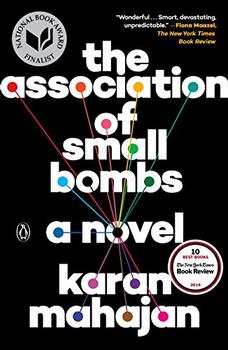Summary | Excerpt | Reviews | Beyond the book | Read-Alikes | Genres & Themes | Author Bio

The Geometry of God is a novel one can read greedily, following four characters as their lives unfold against the backdrop of General Zia’s Pakistan, where religious fundamentalism gains ground and the mujaheddin is funded by gem sales and the Americans.
Amal: the practical sister who digs up the "diamond key" that unlocks the mystery of Pakicetus, a whale-dog creature who once swam the ancient seas that are now Pakistan.
Mehwish: the blind younger sister, who moves with the sun and music inside her and thinks in "cup lits not fully legal."
Zahoor: their heretical grandfather, a scientist who loves variation and "vim zee" and his two granddaughters most of all.
Noman: the young man who steps into a lecture hall, decides "their triangle needs a fourth point," and changes all their lives.
These are the four shifting chambers who make the heart of The Geometry of God, the new novel from lauded Pakistani writer Uzma Aslam Khan. Through these vivid, contradictory, and original characters, Khan celebrates the complexities of familial and erotic love, the tug of curiosity and duty, the intersections of faith and longing. Her exuberant language draws from Urdu and Punjabi and invents one of its own for Mehwish, whose fractured English divides and slows and reveals.
The Geometry of God is a novel one can read greedily, following these characters as their lives unfold against the backdrop of General Zia's Pakistan, where religious fundamentalism gains ground and the mujaheddin is funded by gem sales and the Americans. Or one can savor, as the sisters show us: digging as Amal does toward the novel's deepest questions about love and knowledge and faith, moving as Mehwish does to the rhythms of an abundant and original language.
Reading The Geometry of God was an experience of total immersion, not because I read it in two days but because of the power of the writing and the voices of its four main characters... The story circles through each character's perception of events, like a piece of improvisational music, sifting through the themes of religion vs. science, imagination vs. doing, intellect vs. the senses, and freedom vs. duty. Despite layers of history and decades of turmoil, both love and intelligence prevail. Uzma Aslam Khan presents a convincing case for knowledge and dialogue as the diamond keys to human and international understanding...continued
Full Review
(527 words)
This review is available to non-members for a limited time. For full access,
become a member today.
(Reviewed by Judy Krueger).
This book is Uzma Aslam Khan's third novel. One of her goals as a woman and a Pakistani is to undo formulaic assumptions about her homeland as well as to aid in the struggle for self- ownership, self-representation, and intellectual recognition of women. She writes passionately about this purpose in her essay, "Women and Fiction Today."
She also urges her readers to understand the complexity that is Pakistan today by first admitting our preconceptions about it and then being willing to shed them; to listen and to look. Instead of only relying on our major news outlets, what should we listen to? Where should we look?
 For a start listen to some qawali and Sufi music. At TheSufi.com
you can download free music in mp3 format and videos ...
For a start listen to some qawali and Sufi music. At TheSufi.com
you can download free music in mp3 format and videos ...
This "beyond the book" feature is available to non-members for a limited time. Join today for full access.

If you liked The Geometry of God, try these:

The Association of Small Bombs
by Karan Mahajan
Published 2016
The Association of Small Bombs is an expansive and deeply humane novel that is at once groundbreaking in its empathy, dazzling in its acuity, and ambitious in scope.

36 Arguments for the Existence of God
by Rebecca Goldstein
Published 2011
A hilarious, heartbreaking, and intellectually captivating novel about the rapture and torments of religious experience in all its variety.
At times, our own light goes out, and is rekindled by a spark from another person.
Click Here to find out who said this, as well as discovering other famous literary quotes!